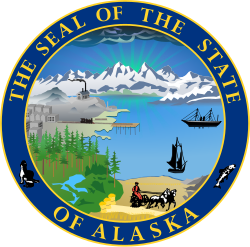| |||||||||||||||||
| |||||||||||||||||
 Results by state house district Stevens: 50–60% 60–70% 70–80% | |||||||||||||||||
| |||||||||||||||||
| Elections in Alaska |
|---|
 |
The 1990 United States Senate election in Alaska was held on November 6, 1990. Incumbent Republican United States Senator Ted Stevens sought re-election to a fifth term (a fourth full term) in the United States Senate, which he won easily, besting his opponents in a landslide.

